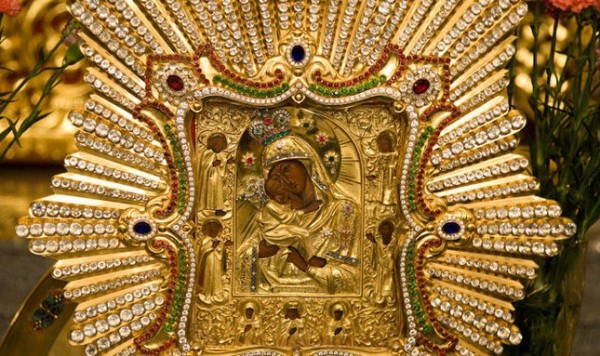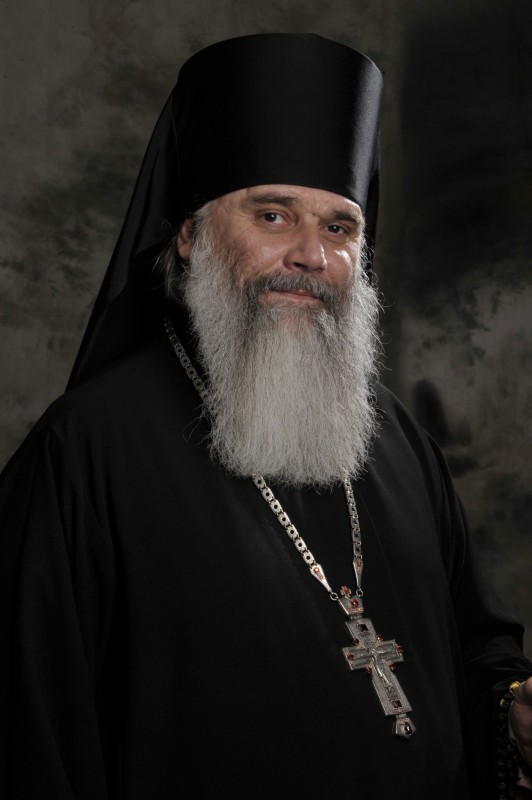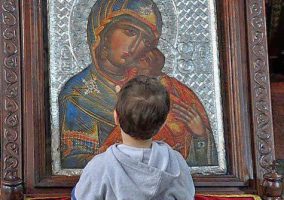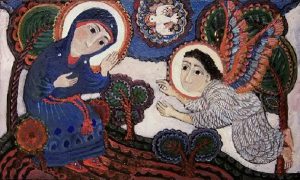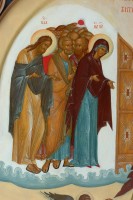In the Name of the Father, and of the Son, and of the Holy Spirit!
“From henceforth all generations shall call me blessed” (Luke 1:48), said the Immaculate Virgin Mary to her cousin Elizabeth after the Annunciation. From that moment she became the Queen of Heaven and earth, the Mother of all people. And for almost two thousand years all nations have called her blessed, hastening to her maternal care, receiving that for which they have asked, and praying before the great multitude of her wonder-working icons. And today we have the grace-filled opportunity again to celebrate joyfully with prayers and spiritual hymns the Queen of Heaven before her Pochaev Icon.
We have now heard the Gospel reading concerning how the Lord Jesus Christ visited the home of Martha and Mary. Martha and Mary received their Divine Guest into their home with joy, but this joy was manifest by them in different ways. While Martha bustled about with appropriate hospitality, Mary sat at the Savior’s feet and listened to what He said. At one point Martha approached the Savior and asked Him to order Mary to help her: “Lord, dost Thou not care that my sister hath left me to serve alone? bid her therefore that she help me. And Jesus answered and said unto her, Martha, Martha, thou art careful and troubled about many things: But one thing is needful, and Mary hath chosen that good part, which shall not be taken away from her” (Luke 10:40-42).
This excerpt from the Gospel according to Luke is always read at feasts of the Theotokos, because the Mother of God united within herself, in her life, Martha and Mary; she united in herself labor and listening to the Word of God, but united them properly, the way they should be.
We see that the Lord did not judge Martha, not leaving her in her domestic bustle, but He also did not send Mary into the kitchen. The Lord said to Martha and Mary, and through them to all people, to all of us, that physical and spiritual labor, labor for the body and labor for the soul, can and should be present in everyone’s life; they are inseparable, but in these labors one needs to observe a given hierarchy. Although these labors are essential – the body must live, and the soul must be nourished – they are far from equal, and each labor must have its own measure.
The primary and singular thing in man’s life from the perspective of Eternity is listening to the Word of God; it is spiritual labor for the sake of the salvation of one’s immortal soul.
Labor for the body is important, but secondary. It should not absorb all of man, all of his powers, capabilities, talents, and his soul and body to the point of forgetfulness of self, of forgetfulness of God. Such labor is meaningless and does not bring spiritual fruits.
The Immaculate Virgin Theotokos gives us all an example of how we should rightly live and rightly labor. The Virgin Mary was a Mother and took care of her betrothed, the Elder Joseph, and of her Divine Son. Of course, this work – as any mother can tell you – is connected with many labors. It takes many labors for a mother to create and maintain a normal, healthy family. But for the Mother of God, these family labors never pushed the one thing needful into the background: faith, prayer, and listening to the Word of God.
Man must labor in order to eat: “If any would not work, neither should he eat” (2 Thessalonians 3:10). Moreover, after the fall into sin and the expulsion of people from Paradise, this labor has been accompanied by many afflictions: “Cursed is the ground for thy sake; in sorrow shalt thou eat of it all the days of thy life; Thorns also and thistles shall it bring forth to thee; and thou shalt eat the herb of the field; In the sweat of thy face shalt thou eat bread, till thou return unto the ground; for out of it wast thou taken” (Geneses 3:17-19). Often this labor is deprived of meaning and joy. Such labor, labor without God – when man puts all his hope only on his own capabilities, mastery, education, strength, on modern technology, and on the collective – never, as we know from history, as well as from our personal experience, has brought or will bring joy, happiness, or fullness of being; it will not bring about any serious, solid results. We know from Holy Scripture how people once tried to create something without God, with their strength alone, but this ended sadly: the Tower of Babylon collapsed, crushing with its wreckage the godless builders and their mindless idea (cf. Genesis 11:4-8). Thus collapse the personal lives of the godless; thus collapse godless families, societies, and states. Wherever there is no reinforced spiritual labor, wherever there is no faith and prayer – and, therefore, no God – the result will always be devastation, catastrophe, and death.
Only physical labor that is accompanied by spiritual activity is meaningful and fruitful, bringing happiness and joy to man, society, and the state. The Apostle calls unto us: “But we beseech you, brethren, that ye increase more and more; And that ye study to be quiet, and to do your own business, and to work with your own hands, as we commanded you; That ye may walk honestly toward them that are without, and that ye may have lack of nothing” (1 Thessalonians 4:10-12). From the history of Christ’s Church, we know that the God-Pleasers always labored: for example, the Apostle Paul, St. Sergius of Radonezh, and St. Serphim of Sarov – and that their labor for the body bore the imprint of God’s blessing, because for them the one thing needful was faith and prayer. They were able rightly to combine the physical and the spiritual, the temporal and the eternal, the corruptible and the immortal. Therein lies the meaning of our lives, therein is our true happiness, and therein is our salvation. Amen.
Delivered on August 5, 2011, in the St. Andrew’s Cathedral of the Holy Trinity Monastery in Ust-Kamenogorsk.
Translated from the Russian.












